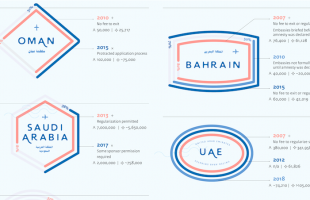Update:
The Nepali migrant worker shown in the video was arrested on September 26 for “not holding an identification card.” The policeman, Badr al-Misry, works in Sabah al-Salim police station. After promising to investigate this “individual incident”, the Ministry of Interior decided to “punish” the officer with 15 days of suspension from work and “delaying his promotion.”
On September 28, a lawyer went to the police station to interview the assaulted worker but was not allowed to see him. Station officials stated that there are “orders” from the ministry not to allow any visits to the worker or to release any information about his case. Lawyer Shaikha al-Jlaibi went to the ministry to challenge these orders, but were not given any resolution. The lawyer issued a statement saying the police station has not given her the name of the detainee, and did not allow her to check on his wellness. This could mean, the lawyer explained,that “there is an attempt to hide evidence and torture marks from being seen and documented.”
Migrant-Rights.org has reached out to al-Jlaibi for the latest update. The lawyer said the detainee was released after having his legal status checked, but that he does not want to press charges against the policeman. al-Jlaibi says there seems to be orders from top officials to suppress information about case. Until his release, al-Jlaibi was not given any information about the detainee, including his name and job. The ministry told al-Jlaibi that the worker had 70 K.D in debt and was released after paying it.
On September 21, Twitter users in Kuwait reacted to a viral video in which a policeman humiliates and beats a detained migrant worker. The policeman orders the detainee to do pushups, kicking him once he is on the floor. Prominent Kuwaiti tweep Mishari Buyabis tweeted the location of the incident, the Sabah al-Salim station, alongside the first three letters of the policeman’s name. The date of the offense is unknown but at the time of the video’s circulation, the policeman was on vacation outside of the country.
Hours after the video went viral, General Shehab al-Shammari announced an investigation into the case; a Ministry of Interior press release stated "The policeman has abused his powers by treating a resident in an arbitrary manner. We do not accept such behavior, and emphasize that this is no more than an individual case that does not represent policemen and the ministry." In response to queries from Migrant-Rights.org, Ministry officials stated they were unable to provide further information until the investigation is complete. Two videos accessible here and here illustrate the nature of ‘stop-and-frisks’ in Kuwait.
Last year, local newspapers reported several cases of policemen (or men dressed as policeman) raping migrant women during house raids. Rhiza, a Filipina worker living in Kuwait, reported that several men came into her house asking for her ID – an action which police are empowered to do - and then raped her. Another woman, Jenny, filed a case against a policeman who severely assaulted her inside the Health Department. In 2013, there were at least three reported cases of policemen raping Filipina women.
In recent years, the widespread use of social media and smartphones has heightened public attention towards police abuse of migrant workers. Just hours after the circulation of preceding video, a new recording was shared online in which a Kuwaiti employee at the Farwaniya Immigration Department is seen assaulting a migrant worker and kicking him out of the department.
Last year, MR reported on leaked pictures of a policeman who humiliated arrested migrants during a house raid. The officer ordered the detainees to pose with Nazi salutes and took photos with them. Neither the Ministry of Interior Affairs, the entity responsible for the crackdown on migrants, nor local media commented on the incident.
In summer 2014, MR also spoke with two migrants detained in crammed police stations; both complained about their treatment during arrest and of poor detention conditions. Yet, despite the regular violations committed against migrant workers by policemen. Despite the regular violations committed against migrant workers, the Ministry of Interior affair has rarely held any of the policemen, nor ministry officials themselves, accountable to abusing their positions of power.
But these videos and photographs reflect only a small portion of the abuses migrant workers daily endure; these incidents are systemic, in part the consequence of workers’ severely obstructed access to justice, police impunity, and generally denigrating social attitudes towards migrants.




